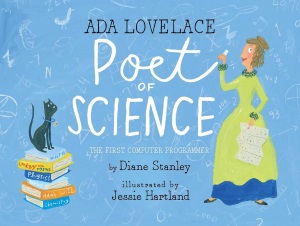2018 School Spending Survey Report
Review of Ada Lovelace, Poet of Science: The First Computer Programmer
Ada Lovelace, Poet of Science: The First Computer Programmer
by Diane Stanley;
illus.
 Ada Lovelace, Poet of Science: The First Computer Programmer
Ada Lovelace, Poet of Science: The First Computer Programmerby Diane Stanley; illus. by Jessie Hartland
Primary Wiseman/Simon 40 pp.
10/16 978-1-4814-5249-6 $17.99
e-book ed. 978-1-4814-5250-2 $10.99
Stanley emphasizes Ada Lovelace’s right- and left-brain pedigree (her father, whom she never knew, was the poet Lord Byron; her mother, a scientist and mathematician) beginning with the book’s title and in several other places throughout. Despite her mother’s aversion to fantasy, literature, and imagination, young Ada manages to merge all three into her scientific education, learning not only how nineteenth-century machines really worked but also detailing their wondrous possibilities. Upon entering society, and having no time for “fashion, fox hunting, or court gossip,” Ada attends weekly gatherings, alongside Dickens and Darwin, hosted by mathematician and inventor Charles Babbage, often referred to as the father of computing. Babbage knows how to build a machine that will calculate mathematics, but not how to make it work; it takes Lovelace, now a wife and mother, to program his design for practical use and produce a written text that explains the process. Multiple entry points — Lovelace as a female mathematician, as a nineteenth-century woman balancing both career and family, and as a visionary kept in the background by society — should attract a diverse readership to this picture-book biography. Hartland’s gouache illustrations combine visual playfulness with pertinent and concrete points in the narrative; a friendly serif font makes for an accessible read. Appended with an author’s note, a discussion about some controversy concerning Lovelace’s contributions, a timeline, selected bibliography, and a glossary. [See also: review of Ada’s Ideas.]
From the January/February 2017 issue of The Horn Book Magazine.
RELATED
RECOMMENDED
ALREADY A SUBSCRIBER? LOG IN
We are currently offering this content for free. Sign up now to activate your personal profile, where you can save articles for future viewing.







Add Comment :-
Be the first reader to comment.
Comment Policy:
Comment should not be empty !!!